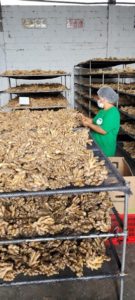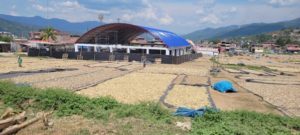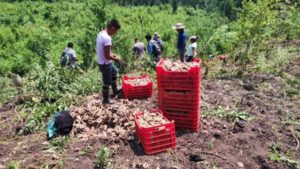Country: Peru
Sector: Ginger & Turmeric
Investment: Scaling up of dehydration capacity
Total estimated capital expenditure: USD 500K for phase 1
Investment type: Subordinated loan
Investment by Kampani: USD 500K (for 7 years)
Disbursement: November 2022
The Business
Established in 2019, APASEM is a young cooperative of 404 members, with a focus on producing high quality organic ginger and turmeric. Kampani was introduced to APASEM by one of our NGO-shareholders, Rikolto, during a trip to Peru in July 2022. APASEM manages each stage of the supply chain including production, processing and sales, for both the national and international markets.
Peru has been cultivating ginger – also known locally as “kion”, for two centuries, but started exporting it only recently. Peruvian kion is recognized as being of superior quality, with most of the exported ginger being organic.
The Investment
Kampani’s investment concerns a fairly straightforward scale up. The cooperative is currently able to satisfy only a small portion of the demand for dehydrated ginger. It therefore wishes to increase the capacity of its processing facilities, and its dehydration capacity in particular.
The export market for fresh ginger is very demanding. Up to 35% of the volume brought to the processing plant is currently discarded because it does not meet export-grade requirements: it is either too small, or has too many blemishes and cuts etc. Kampani has agreed to finance a processing line that will convert these discards into organic certified dehydrated slivers and powder – product categories much sought-after by the market. Kampani’s investment will literally turn waste into something of value.
The social impact
Kampani’s investment is directly related to APASEM’s social impact. Currently, most farmers have around 2 hectares of land producing up to 20 tons of ginger or turmeric annually, but each year about 30-35% of the fresh ginger gets discarded. By using the discarded parts of the root, the average farmer will gain an additional USD 1,495 of income. In short, APASEM is helping smallholders access income they would otherwise not have. And as the cooperative becomes stronger and better capitalised, increased profits will be generated for distributing amongst members.
In other words, APASEM contributes to alleviating poverty and improving livelihoods by ensuring reliable access to (specialty) markets and paying a competitive price to a growing number of producers, especially women and youth. APASEM also supports and encourages regenerative agricultural practices by providing technical assistance activities to help smallholders improve the quality of their produce and take care of their soils. The founders of APASEM are third generation smallholders from the Junín province who have received higher education in the cities and returned to give back to their communities.


